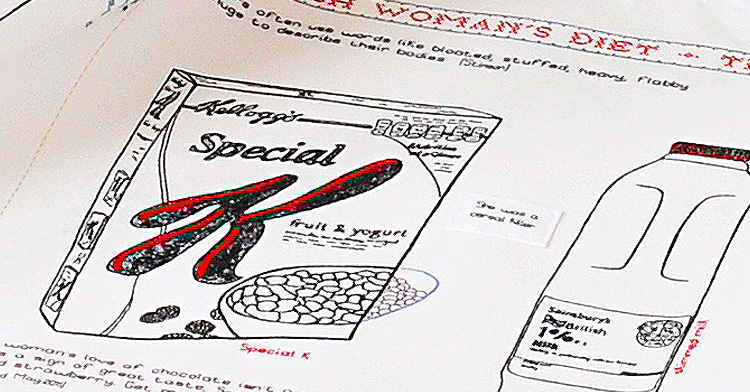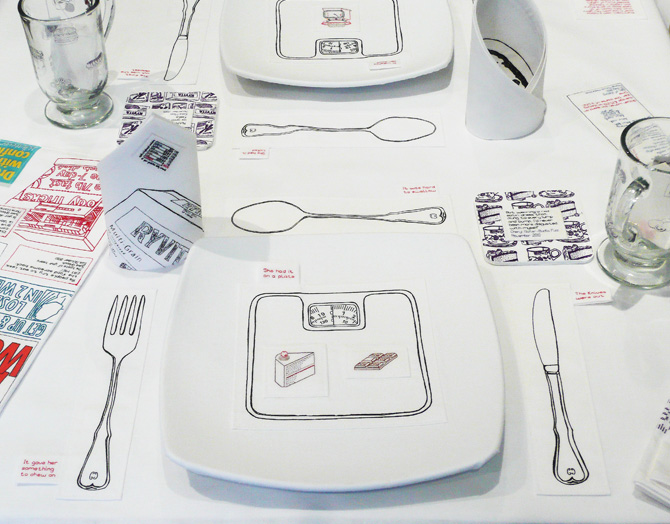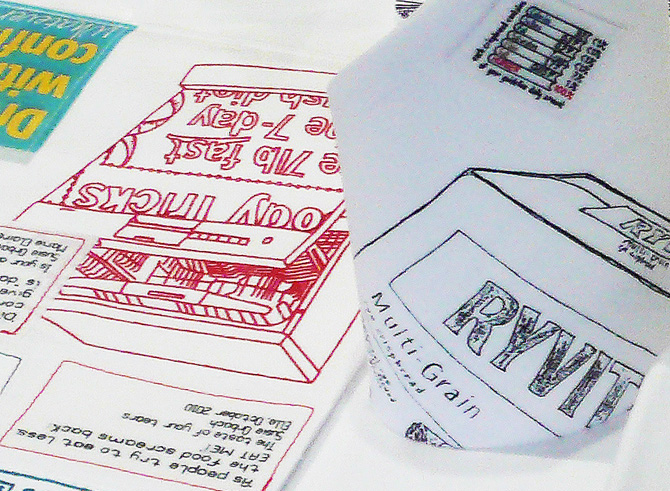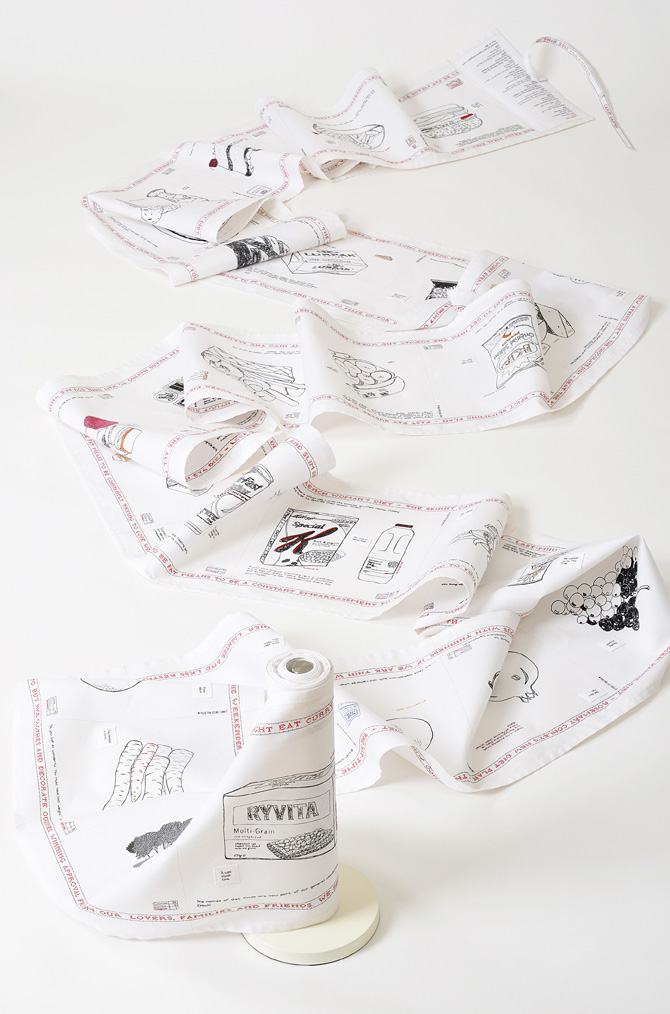Caren Garfen interview: The need to spread my wings

In 2007 Caren graduated from the University of Hertfordshire with a First Class (Hons) degree in the Applied Arts. She now works as an artist using textiles as a backdrop to create works relating to women’s issues in the 21st century, exploring, amongst other things, work/life balance.
Prior to studying and becoming a contemporary textile artist, she worked as a craftsperson hand stitching top-of-the-range, miniature, traditional samplers for dolls houses. Her work was sold all over the world to adult collectors.
We were greatly impressed by Caren’s work at the recent Knitting and Stitching show and, needless to say, we’re delighted she has agreed to chat to us about her influences, background and working practices.

Don’t make a meal of it (detail), 2011
The need to spread my wings
TextileArtist.org: What or who were your early influences and how has your life/upbringing influenced your work?
Caren Garfen: When I was a child I was surrounded by fabrics, threads, wools, sewing and embroidery. My mother was a very able hand at knitting, making clothes and tapestry. My aunt was particularly talented with the needle and my grandmother made textile collages in her later years. The truth be told, my twin sister was much more capable than I, she even won a prize at school for making a bride’s dress for a doll whilst I didn’t win… even though I thought mine looked the same as hers! I was taught needlework at school and found the whole process completely tedious! As an adult everything changed when I started a business creating miniature hand stitched samplers for dolls’ houses, I always loved miniatures and found that I could actually sew after all!
What was your route to becoming an artist?
I always wanted to be an artist and studied art at school up to and including ‘A’ level, but was sent off to Teacher’s Training so that I would have ‘a proper job’ at the end of it. I chose art as my main subject but was not happy and left after a year. I dabbled in drawing, painting, cake decorating and jewellery-making for many years; there was always a need to create something. Once I was married and had my first child I started my own business creating authentic miniature dolls’ house samplers for adult collectors, selling my stitchery all over the UK whilst my American agent sold work throughout the USA, Europe and Japan. It was a wonderful period as it fitted in very well with my life as a mother and by the time my second child was born my business was very well established. I carried on with my samplers for 15 years, but as the girls grew up I felt the need to spread my wings. I studied for a City & Guilds in Creative Embroidery and from there went on to university and achieved a First Class Honours degree in the Applied Arts specialising in photographic silkscreen printing. Once I had my degree it was a natural progression to give up my business and to concentrate on making large textile artworks instead. My degree work was exhibited at New Designers in 2007 which led to being selected by the Embroiderers Guild for the Graduate Showcase at The Knitting & Stitching Shows. Many other exhibitions and opportunities grew from that including being chosen as the Embroiderers Guild’s Scholar the following year and being awarded the One Year On Award at New Designers.
What is your chosen medium and what are your techniques?
I use textiles as a backdrop on which to put forward concepts relating to women’s issues in the 21st century. Artworks have included a never-ending ‘tea towel’, ‘textile’ wallpaper, and ‘window blinds’. I use meticulous hand stitch and silkscreen printing to convey my message.
Fine textile art
How would you describe your work and where do you think it fits within the sphere of contemporary textile art?
I consider my work to be floating between textile art and fine art; fine textile art as it were. It fits very well in textile exhibitions but also has a place in the fine art arena. This year an artwork, completely hand stitched, was selected for the Royal Academy of Arts Summer Exhibition. This piece, ‘House Work’, was also chosen as only one of ten ‘Works of the Week’, which was thrilling.
Tell us a bit about your process and what environment you like to work in?
My process usually follows the same order:
1. Inspiration/Idea.
2. Title.
3. Sketchbook.
4. Research.
5. Questionnaire.
6. Drawings.
7. Paper pattern.
8. Silkscreen Printing.
9. Hand stitch.
10. Construction of artwork.
I always do a huge amount of research before I even begin to make an artwork. I will uncover every story, survey, magazine, book, etc., until I am totally satisfied that I have covered every base.
I use studio space at my old university for silkscreen printing and luckily I was selected for AA2A (Artists Access to Art Colleges Scheme) for the second time, and this year was able to use 100+ free hours of printing time and obtain funds towards materials. I do all of the stitch work and construction at home.

Don’t make a meal of it (detail), 2011
Inspiration
What currently inspires you and which other artists do you admire and why?
I am inspired by articles in magazines and newspapers, something I have seen on the news or heard on the grapevine, and my ears prick up if it is a subject which affects women’s lives today. Recently I have become particularly interested in social history with the comparison between the lives of women in past centuries and how we live now.
I have a huge admiration for Grayson Perry, he is an incredibly intelligent artist and is not afraid to use any medium to get his point across. I went to visit his exhibition at The British Museum and more recently his tapestries at the Victoria Miro Gallery. He is a complete inspiration. I love going to art galleries, there is always something to absorb and be inspired by. Other artists who have been motivational are 1970s Feminist artists, Judy Chicago, Miriam Schapiro and Aviva Rahmani.
How has your work developed since you began and how do you see it evolving in the future?
My work is constantly developing. It is very important that each time I make a piece that ideas and challenges advance; I do not want my work to remain static. I can see it evolving with more hand stitch, and would like to create new pieces which are site-specific. I am particularly interested in researching the social history behind buildings and places and would like to make artworks to fit into these areas.
Commisions & Exhibitions
How do you go about choosing where to show your work?
As a member of The 62 Group of Textile Artists there are excellent opportunities to exhibit at galleries both here and overseas. I have also been invited by curators to show my work in their exhibitions which is always a great compliment. In 2010 I was commissioned to create an artwork for ‘Quilts 1700-2010’ at the Victoria & Albert Museum which was a fantastic challenge as I had never made a quilt before!

Wafer Thin, 2012
Where can readers see your work this year?
This has been an incredibly busy year. As we come to the end of 2012 the last show where my work can be seen will be at The Knitting & Stitching Show in Harrogate where ‘Wafer Thin’, a new art piece, can be seen on The 62 Group’s stand. My work has featured in many publications including Mary Schoeser’s ‘Textiles’ published by Thames & Hudson in November, and Alice Kettle’s & Jane McKeating’s, ‘Hand Stitch Perspectives’, (the book launch will also be at The Knit & Stitch with another artwork ‘Team Spirit’ exhibited with them).
For more information please visit: www.carengarfen.com
Let us know us know if you’ve enjoyed this interview by leaving a comment below.
















Hello,
Please may I have more information on this article as I would like to reference this article for my BA dissertation and credit the writer.
Thank you
Hi Ailish, This was an interview conducted between Joe Pitcher at TextileArtist.org and Caren Garden this year:
I have been to Physiotherapy Associates many times for different problems, each time utilizing Lisa as my therapist.